Ira L. Frost
Chapter 5
1930 – 1934
Unity
Then came the preparations for the move. The first few days of December were spent
moving machinery; then the livestock and household goods. It was
rather a discouraging time due to the condition of the home they were
moving into. It was a three room house with building paper lining the
badly cracked walls. To make matters worse, Ira was having back
problems. He had previously had such ailments, but this time he had
to seek doctor's treatments and was unable to get out of bed for
a few days without help. Vyla did the chores and helped Ira out of
bed and to the doctor. It was several days before he was able to get
up and around.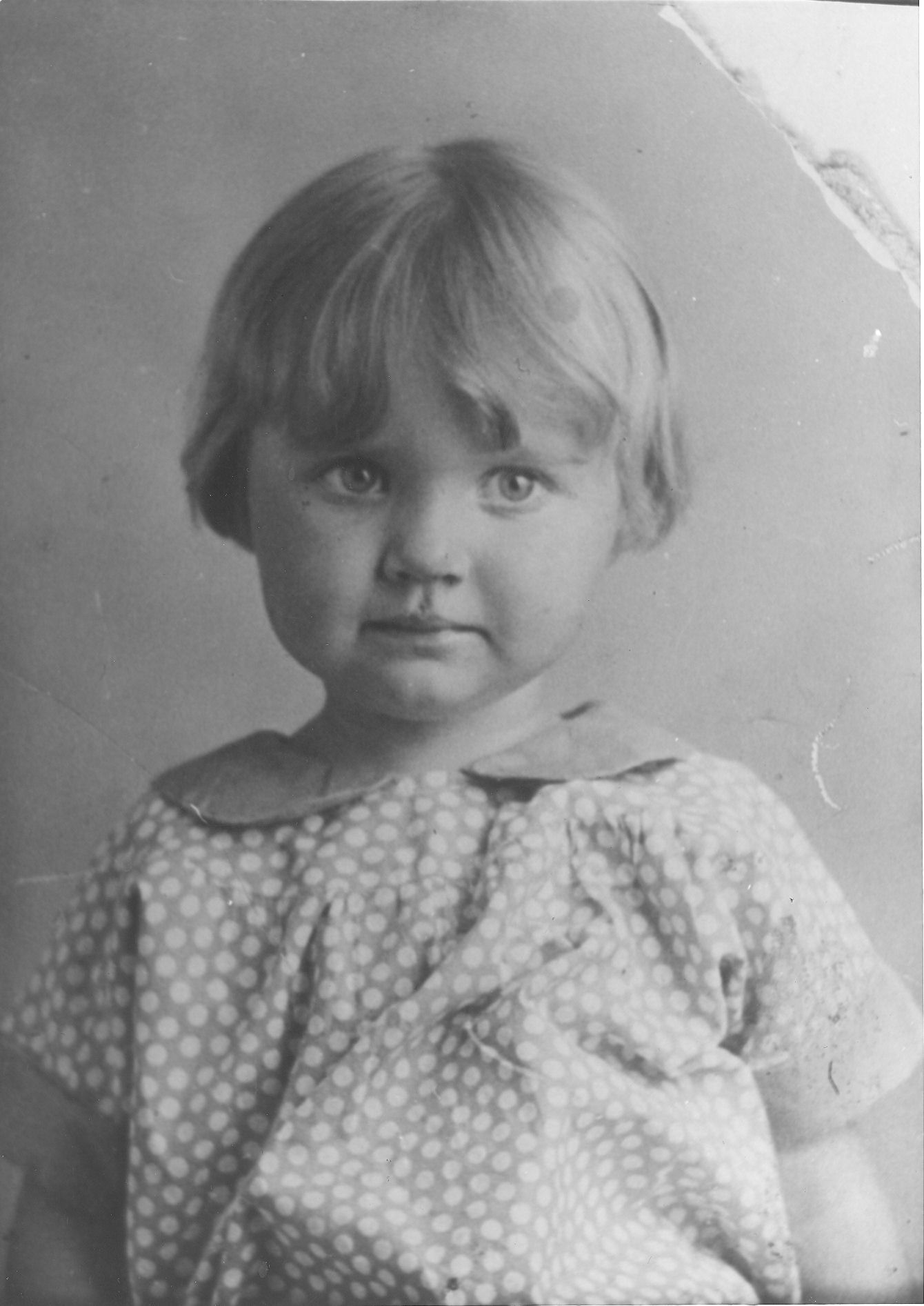
Celia
Car salesmen were always looking for someone in the market for automobiles, and frequently called on Ira. Jess Casper was constantly trying to persuade him to buy. Ira drove one home from Rupert on a trial basis, and with his streak of luck, wouldn't you know it quit him before he made it home! It helped him make a quick decision, as he decided things looked better at the Ford dealer. After a few days, in between more back problems, chasing horses, hauling hay, fixing the hog house, and other everyday chores, he made a deal for a car. They got it the day before Christmas. As they were coming home from town after consulting Santa, they had a blowout. . . On Christmas Day Vyla's folks were there for dinner and an enjoyable day. The year 1929 ended with a party at his sister, Faye's home.
The winter of 1930 was typical. Ira did a few odd jobs around the place in preparation for the spring farming and tried to make the family comfortable in the drafty house. They put blankets up to the walls, and if the wind blew from the west, they spent their time in the east room; if it blew from the east, they moved to the west end. They had their share of snowstorms and so spent evenings around the pot-bellied coal stove reading. They were getting acquainted with the people of the Unity Ward, to which they belonged.
Money was scarce, as it was the beginning of the big depression due to the crash of 1929. Nevertheless, Ira managed to keep food on the table and was ready in the spring to farm the new place, which consisted of forty acres just below the first lift canal. There was also about sixty acres of pasture land next to the river, separated from the rest of the farm by the highway.
Early in May they
received the five hundred baby chicks they had ordered. Ira's father
had contacted pneumonia and his condition was serious. On the night
of May 14, 1930, in a terrible rain, lightening and thunderstorm, Ira
and Vyla were called in to see him, as his condition was
deteriorating. On the way to town, another car ran into them. That
night Father Frost passed away. After a sorrowful evening with his
mother and family, they arrived home late and found that the rain had
put out the heater in the chicken house and all but about a dozen of
the baby chicks had drowned or frozen.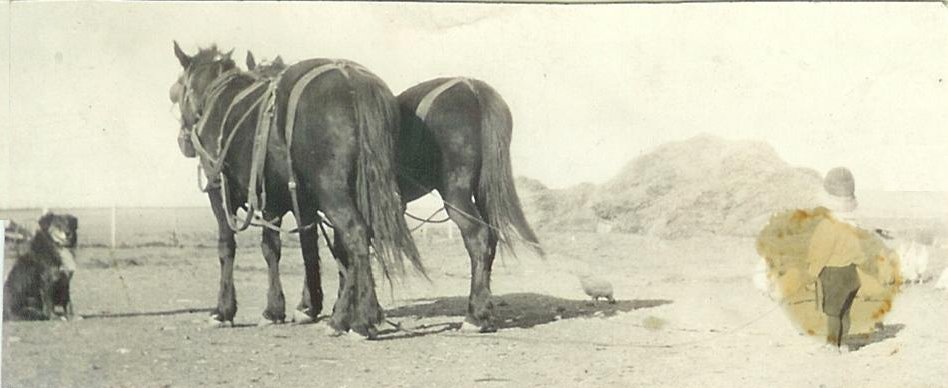
Old Short - the Dog, a team of horse's, a chicken, and Myron
The spring and summer of 1930 was a challenge for Ira, but he had a fair year of farming and was busy. He discovered the north end of the farm was difficult to irrigate because of the gully dividing the farm. There was also a willow patch at the west center of the farm. Ira always made the best he could with what he had and was faithful in the church assignments and attending meetings with the family. He was a kind loving father to his wife and children. That fall, he had an especially nice birthday gift. . . the arrival of a baby girl on September 12, the day after his birthday. Vyla went into Mother Dayley's for the big event. His sister, Pearl, stayed with the rest of the family. The baby was a little blonde girl; they named her Marian, after a special uncle. Vyla stayed with her mother for ten days and when she and the baby came home, it was a happy occasion.
As we look into the life
of Ira and his family for the remainder of 1930 and 1931 and into the
beginning of 1932, we can say that the family was growing and quite
helpful around the farm and enjoying a good family relationship.
These were trying times financially and the Frosts experienced many
hardships. But there was much to be thankful for and these were
happy, satisfying days. As the spring of 1932 approached, Ira and
Vyla were preparing for the arrival of another baby. He had arranged
for the doctor to be on call, but on March 3, when they
needed him, he was a little late in arriving. Mrs. Peterson and Mrs.
Stout were present to assist Vyla in the delivery, and someone
announced it to be a boy. A half hour later when the Doctor came, he
diagnosed the sex of the new baby as a girl and asked if Vyla wanted
him to take it back. Well, they were hoping for a boy, but the
darling little pixie-faced baby girl stole the hearts of all and they
named her Irma. 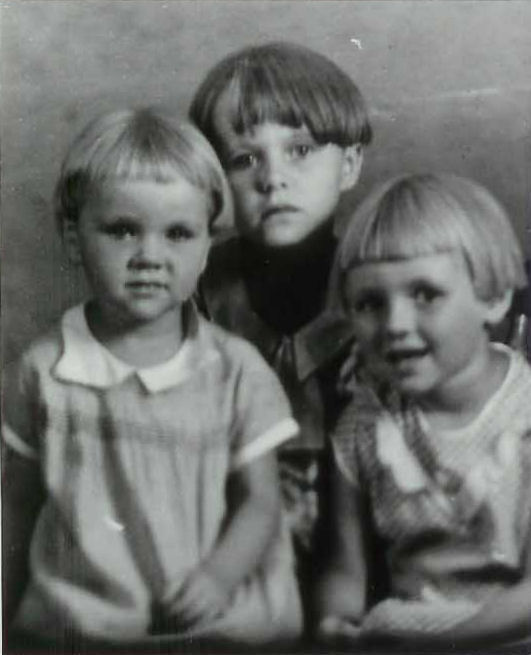
Irma, Lorna, and Marion
The Peterson family was their closest neighbors. Ira was good to them and they may have taken advantage of his good nature; they had no well and hauled their water from the Frost place. At times the well went dry and the water would be low after using excessive amounts. Monday was always Vyla's washday, but their neighbors seemed to hurry down on Monday mornings and pump their wash water so that often times when Vyla was ready to wash, there would be no more water. Mrs. Peterson also used Vyla's clothes lines to hang her clothes. On many occasions, when Vyla had her wash out first, she would remove the clothes before they were dry, and hang out her own. In the spring of 1934 the Petersons moved away and the Gooch family settled in their place. This was the beginning of a long lasting and happy friendship. The Gooch family had children of the approximate ages of the Frosts'.
Ira was gradually making small improvements on the place, including a new well, which sunk in, making it necessary to haul dirt in to pack around it. They removed the old shack from the back of the house and built a porch onto the front. One of the nicest improvements to the family, in Myron's opinion, happened on December 10, 1933. Vyla gave birth to a baby boy and Myron had a brother at last! Needless to say, Ira was pleased also, and was happy to give him his name, Gerald. The other children were sick with one of the common childhood diseases, so the Gooch children couldn't come in. They wanted to see the new baby, so they peeked through the window. The year drew to a close with much to be thankful for and with as nice a Christmas as Ira and Vyla could afford for their family.
The year 1934 brought
with it a continuation of hard times. Ira was milking cows by hand
and selling the cream for thirteen cents a pound and sold a fat
two-year old bull for only thirteen dollars. January 7 was a special
day, as the whole family went to church to witness the blessing of
the new baby by Fred Adams. The full name, Gerald Ira Frost, was not
definitely decided on until just the night before he was blessed.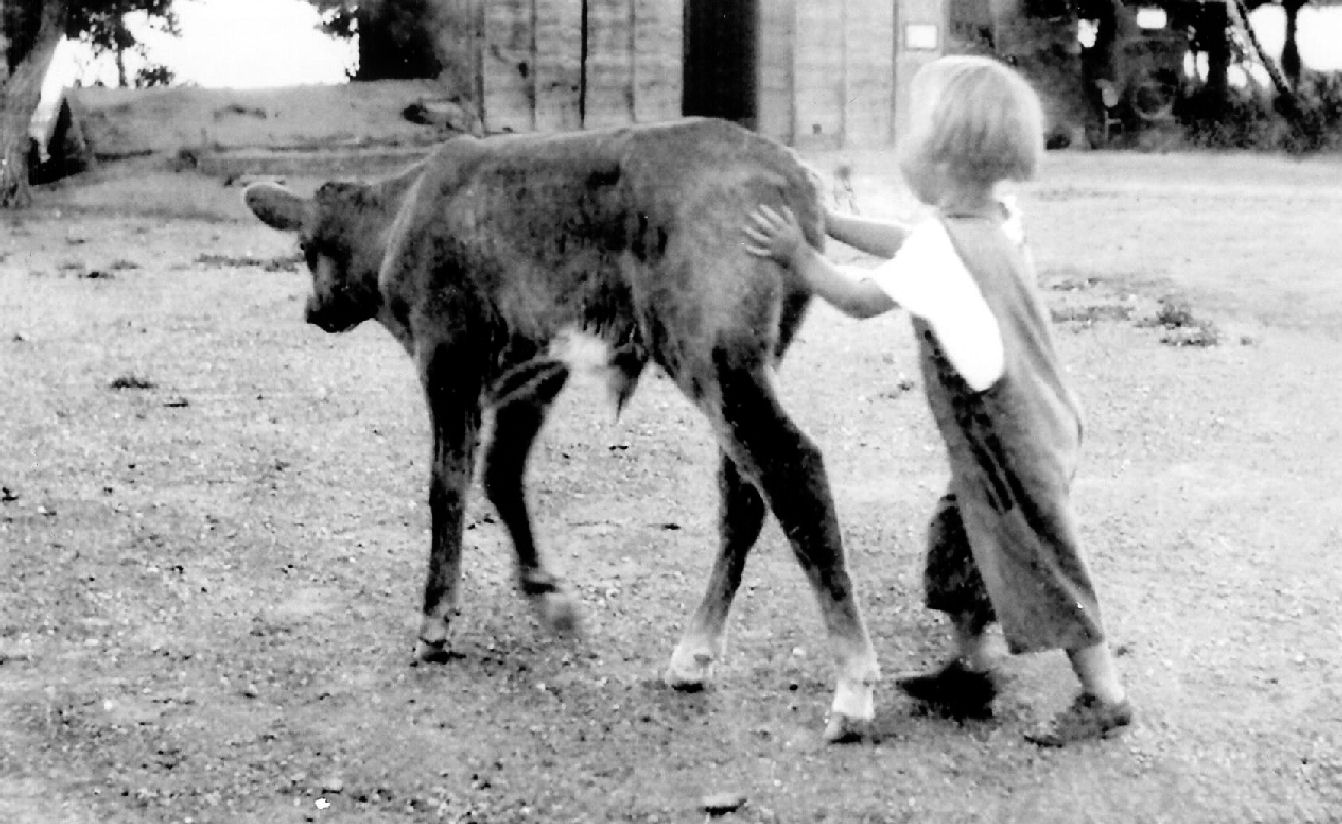
Celia herding a calf
The rest of the winter, Ira was mending fences, building stanchions in the barn, and making some hog feed from cooked cull potatoes and wheat. He butchered a hog with the help of Mr. Gooch. This meat was picked up by truck and hauled to Salt Lake City as Ira's donation for tithes and offerings for the year. He butchered a calf and gave a big share of it to their parents. His time was also spent in such everyday chores as mending chairs, fixing the butter churn, hauling manure, and always, there was the wood to be chopped to keep the home fires burning. He cleaned out the cellar, oiled and mended the horse harnesses, re-soled and mended some shoes, and cleaned out the hog pens.
He often had occasion to need a veterinarian for sick livestock. There was a well known vet in town who was quite a character. . . Old Doc Englebritson, when not out on call, could always be found in, or on the street between some of the pool halls in downtown Burley. Ira or Vyla would go to town and bring him out. If the children happened to be along in the back seat of the car, they would snicker to one another and prepare to dodge as he spit his tobacco out the window. The Doc always wore bib overalls, had a white beard and mustache and thick glasses. He was often at the end of some snide remark from one of the children. And, incidentally, he was afraid of horses...
Ira was called
to be first counselor in the Sunday School Superintendency in
February of 1934. He always enjoyed the visits of the brethren from
Salt Lake for conferences, and mentions Apostle Widstoe speaking to
them. There was the usual family illnesses with treatments of mustard
plasters for their chest colds and Vicks and cough syrup, as well as
other home remedies used rather than seeing a Doctor. This winter,
the baby had some stomach disorders and Vyla suffered with boils.
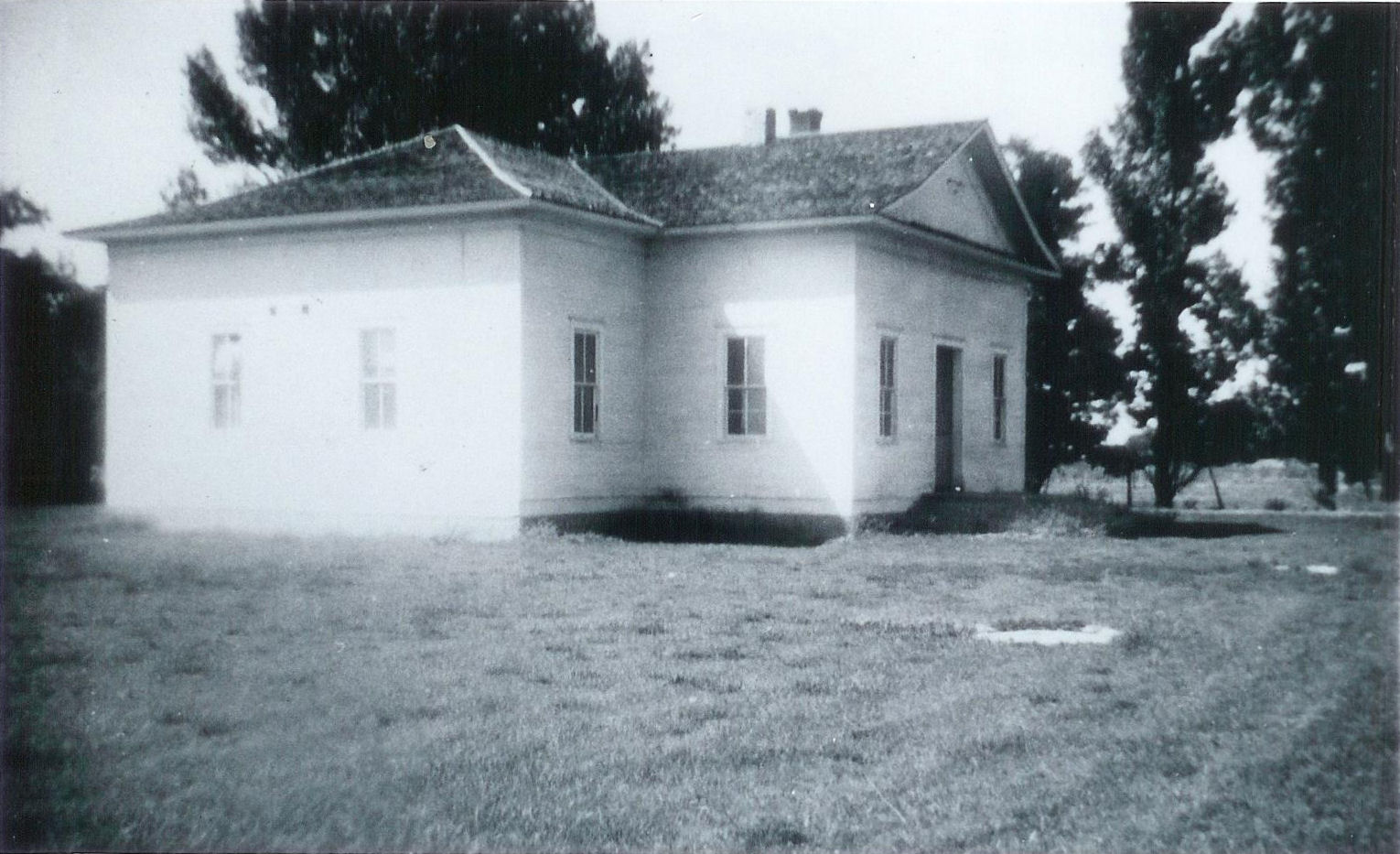
The old Unity Ward Meetinghouse
Some events Ira mentioned in his diary in the early part of 1934 were: By March, the spring plowing and preparation for planting was well advanced. March 12 was an earthquake and the kids were sent home from school. The early part of April brought a bad cold spell and blizzard. They always made the best of situations and used the snow to make a freezer of ice cream. There was a historic occasion which caused some excitement in Burley and Ira took the family out of school to join the large crowd to see a new streamline train that was passing through. Ira did the chores for the Gooch family, as he quite often did, when they visited their relatives in Blackfoot. They were good neighbors and the two families did many things together, both in work and play.
Both Ira and Vyla were
involved in genealogy work during these years. It seems there were
few church members who could see the importance of this work and the
Frosts' had very little support from others. One evening when they
were in town at Aunt Marge's working on genealogy, the horses got out
and ran the cows through the corral. The next few days were spent
building a new corral. There was also another earthquake. Later in
the spring of 1934, the family bought a much needed used davenport.
This was the spring Myron did his first harrowing, Celia had an acute
gall bladder infection and yellow jaundice, and there was still
another earth tremor. Then there was the excitement of the family
watching a parachute exhibition at the airport. The older children
had the opportunity of taking an airplane ride. Thus went the spring
and soon the beet thinning had to be done. Ira and Vyla decided they
would let Mother Dayley keep the baby with her a few days so she
could work in the beets. When they arrived at her home, she just
could not leave him, as Ira said, she got faint hearted and
brought him back home.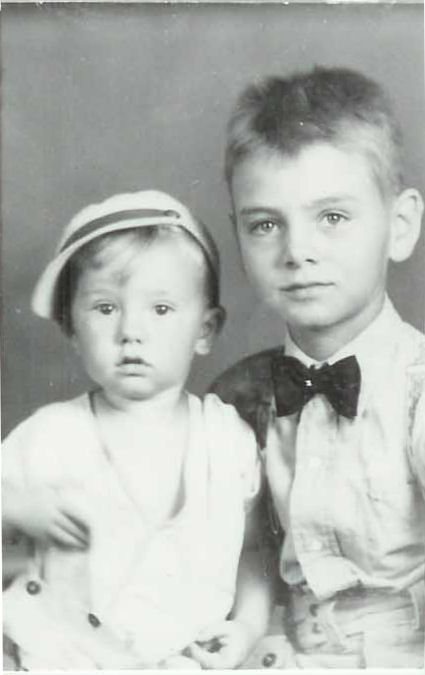
Gerald and Myron
Ira was always willing to help Vyla in the weekly chore of washing. It was a difficult job, as they pumped the water by hand and heated it on the stove in a big boiler (tub). The hot water was then poured into the gas motor washing machine and tubs. By the time the clothes were sorted, put into the hot soapy water with her home made soap, run through the ringer into the first tub of clear water, run through the ringer again into the cool rinse water with bluing in it, rung out and piled into baskets to be hung outside on the lines. . . it was time to rest! Only on the coldest, wettest days were the clothes hung on racks around the room. Trying to dry clothes in a small house with all the family around was no easy task.
Ira was diligent in his geology and research work, which he believed to be important and he helped organize and supported the organizing of the Frost and Warner families. Their mother's birthdays were June 17 and June 18, so they took this year to help them celebrate by having a special dinner for them.
A long remembered happening of this summer was a hot day in July when some of the Gooch family were visiting with the Frosts. The boys were in the cow's corral playing rodeo, when little Irma was discovered floating unconscious in the irrigation ditch. She was snatched from the ditch and rolled over a barrel to drain the water from her lungs, They wrapped her in blankets and, as she opened her eyes, a thankful family knelt in prayer for her safety.
Ira and Vyla, with Mr.
and Mrs. Gooch planned a special temple excursion during the
summertime. They left home at 2:00 a.m. and spent two days at the
Logan Temple and a day of picnicing with some of the relatives of
Gooch's in the Logan Canyon. They went to the Temple again before
returning home. Mother Frost stayed with the children during the time
they were gone. When they returned, they found that the wind had
scattered the hay all over the field and blew the top hay from the
haystack. In August, Ira had his first experience of baptizing one of
his children. With the assistance of F. H. Manning, he baptized Celia
in the canal on her birthday. 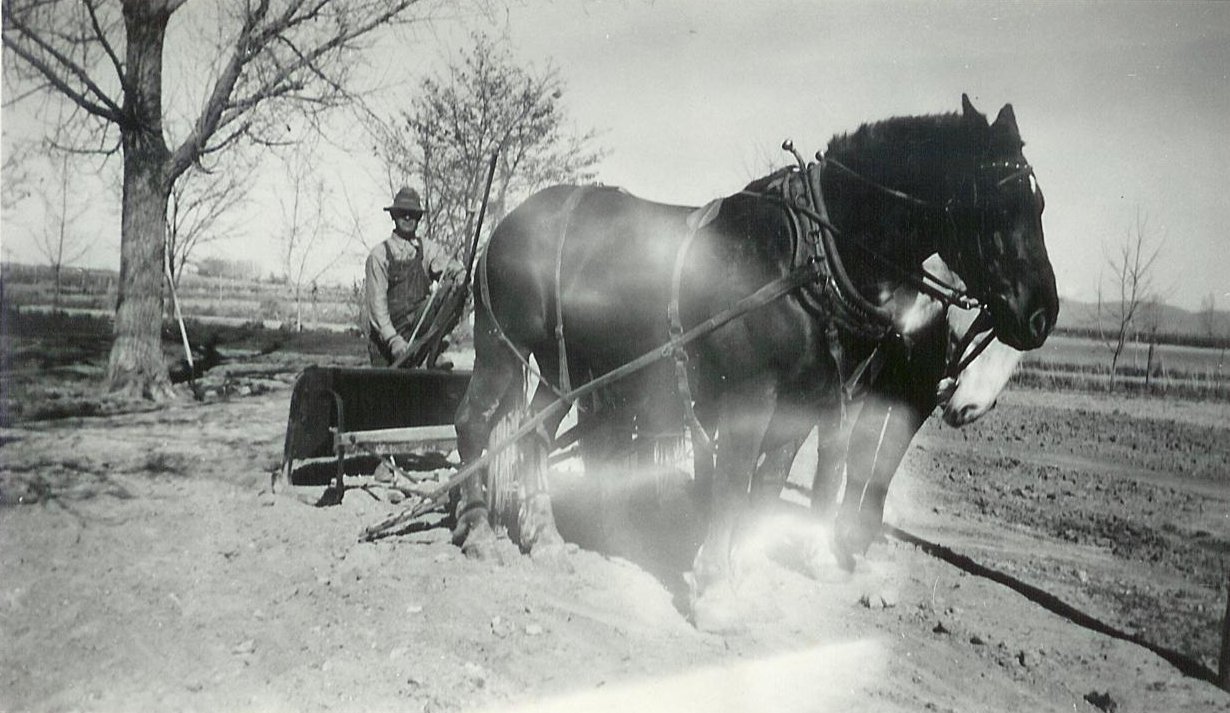
Ira working a team of horses
During the late summer and the early fall, Ira made numerous trips with the team and wagon to the Willow Creek area or sometimes east of Declo for loads of sage wood. It was a hot dusty job which took all day long. The children looked forward to these trips, and if they were the lucky ones to get to go, felt it was quite a treat... ..that is, until they finally wised up and found out it was more of a job than an outing. The sage wood was pulled up, loaded onto the wagon, taken home and piled up for use in the heater and the cook stove during the winter to help stretch out the use of coal.
It has kind of a tradition that the family give interesting names to the animals. . . There were horses called Toots, Cap, Queen and Prince and cows called Dandy, Cherry, Stub, and Crony. Dandy was sold that fall for eighteen dollars. It was still hard times and was a constant effort to provide for the growing family. This was the time of President Roosevelt's New Deal, by which he was trying to create work for everybody and bring the country out of the depression. The W.P.A. was one of the programs to provide work and Ira had his name on the list, trying desperately for a chance to work. He finally got called, but only for four days at fifty cents per hour for an eight hour day. It helped, but he still had to try every means he could to provide for the family. He traded some livestock for wheat and flour.
Chapter 6